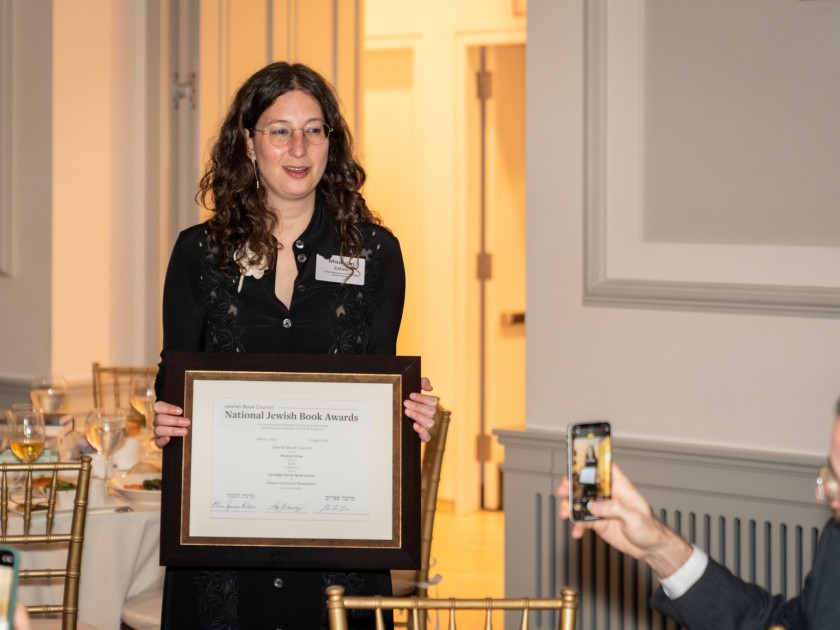
Maayan Eitan at the 72nd National Jewish Book Awards Celebration
Photograph by Leor Michan
On March 1, 2023, we had the honor of celebrating the 72nd National Jewish Book Award winners at Bohemian National Hall. Over the next few weeks, we will be publishing the remarks of the winners who spoke at this celebratory dinner. Maayan Eitan is the winner of the Hebrew Fiction in Translation: Jane Weitzman Award for her book Love.
I started writing Love a decade ago, and it was published, in Hebrew, almost three years ago to this day. There is something anachronistic – completely misplaced in time – in speaking, tonight, about a book that, at least for me, belongs so much in the past. And yet perhaps it would only be possible to speak about a book titled “love” anachronistically. “The experience of eros”, we’re told by Anne Carson, “is a study in the ambiguities of time”. “The lover’s real desire”, Carson continues, “is to elude the certainties of physics and float in the ambiguities of a space-time where absent is present and ‘now’ can include ‘then’ without ceasing to be ‘now’”.
And so I would like to mention, tonight, not only the ambiguities of that amorous “space-time where absent is present”, but also the always already ambiguous meeting-place of languages, in my case Hebrew and English, and the ambiguities of translation. I translated Love on a whim, never imagining that it would travel this far; and I would like to thank the Jewish Book Council and the judges for the Jane Weitzman Award for Hebrew Fiction in Translation for helping it elude some of the certainties of literary markets and of my own limited imagination. Thank you for making my book present. I hope that I managed to make the English translation somehow include its Hebrew origin, without ceasing to be English.
I came to New York a few days ago from Tel Aviv, where I have lived for the past eight years. For anyone wishing to hold to democratic and humanistic values, Israel is a challenging place to live in today – perhaps it always had been. I don’t know whether literature can influence politics, or how. Yet I would still like to believe in the intrinsic power of literature and writing as such. Thus I’d like to conclude my remarks tonight with a quote by George Steiner. “[W]hen the text is the homeland”, Steiner wrote, “even when it is rooted only in the exact remembrance and seeking of a handful of wanderers, nomads of the word, it cannot be extinguished. Time is truth’s passport”, Steiner adds, “and its native ground. What better lodging for the Jew?”
Thank you.
Maayan Eitan’s short fiction and essays have been published in The Kenyon Review and World Literature Today. She holds a master’s degree in comparative literature from the University of Michigan, Ann Arbor, and is currently pursuing a PhD in Hebrew in literature in Israel. She lives in Tel Aviv